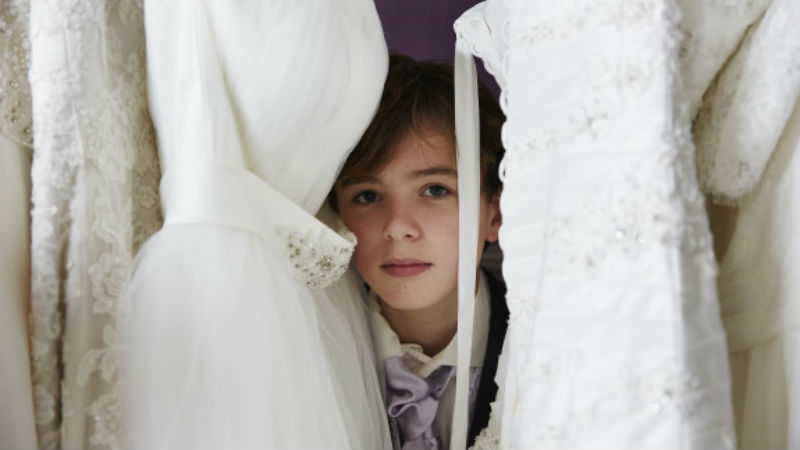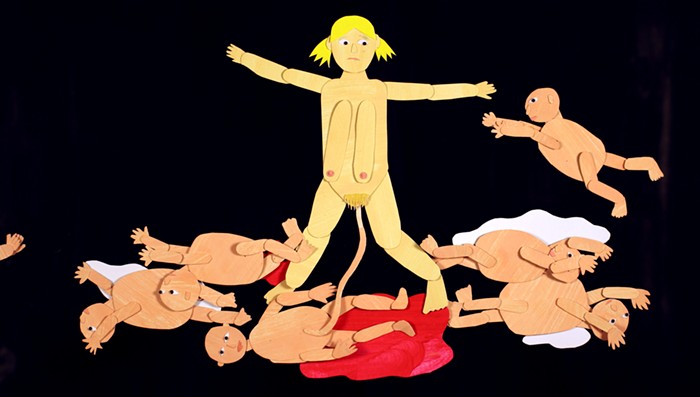Just a few years back, finding a film dealing with the subjects of transsexuality and transgenderness was equivalent to finding a needle on a haystack. And the few and far between often used cis actors (in a practice described as transface), such as Eddie Redmayne as Lili Elbe in Tom Hooper The Danish Girl (2015). There were also lyrical and artistic portraits of trans people, such as Tilda Swinton is Sally Popper’s Orlando (1992). Realistic representations of trans people using trans people, on the other hand, were almost non-existent.
Times have changed quickly. Just last week, the Best Foreign Language Picture Academy Award went to Sebastián Lelio’s A Fantastic Woman. This superb Chilean drama tells the story of a transsexual woman called Marina Vidal (played by trans actor Daniela Vega) dealing with the unexpected bereavement of her lover and the undesirable encounter with his children and former wife, and the moment all the ugly transphobia gets out of the cage. This is a major achievement for transsexual people, but of course a swallow doesn’t make a summer.
So we decided to compile a list of 10 films dealing with transsexual and/or transgender characters from the past two years that everyone should see. They come literally all corners of the world, from Latin America to India, from Uganda to Albania! Click on the film title in order to accede to our exclusive dirty review!
And don’t forget the next BFI Flare London LGBT Film Festival starts in just a few days on March 21st!
.
1. The Pearl of Africa (Jonny Von Wallström, 2016):
Homosexuality is a taboo in Uganda, to say the least. The country actively and consistently persecutes LGBTI people. In countries there is often tacit acceptance and complicity as long as the homosexual marries a partner of the opposite sex and lives a dual life. Such possibility does not seem to exist in Uganda, where the mere suspicion of homosexuality or any sort of deviant sexuality is often a trigger for social convulsion.
This doc portrays the life of 28-year-old transgender Ugandan Cleopatra Kambugu. She was biologically born a man, but already in her early years begins wearing female clothes and identifying as a woman. She found the support of her lifelong partner and mother and, against all odds, lived a relatively hassle free life in her home country. Until the local tabloid Red Pepper decide to “denounce” and “gay-shame” her, forcing Cleopatra into hiding.
.
2. Sworn Virgin (Laura Bispuri, 2016):
Hana (Alba Rohrwacher) lives with her sister Lila (Flonja Kodheli) and their parents in the remote mountains of Albania. Lila then escapes to the West in the hope of a better life, leaving Hana to care for her parents. Hana then decides to become Mark so that she can perform the family duties that only a man is allowed to carry out (such as handling a shotgun and hunting), according to strict social rules. She undergoes a conversion ritual, cuts her hair and begins to wear male clothes, all with the full consent and support of her parents as well as the rest of the community.
Sworn Virgin tells two stories in parallel: of Hana becoming Mark in rural Albania, and of Mark becoming Hana once again in Italy. After the death of his parents, Mark moves to Italy in order to live with his sister Lila, now married and with a child. He slowly settles in the new environment, and begins to shed the male clothes and identity, which she has carried for so long.
.
3. Transit Havana (Daniel Abma, 2016):
Cuba is a country of stark social and political conflicts and paradoxes, and perhaps no one epitomises those contraditions better than the few transsexuals living in the country’s capital. Despite major advances and the staunch support of Mariela Castro Espín (Raúl Castro daughter), Odette, Juani and Malú they still face religious intolerance, discrimination, sexism, poverty and sometimes a life in prostitution. Meanwhile, they wait for surgeons from Belgium and the Netherlands to perform a much-coveted sex change surgery on them.
These transsexuals have to reconcile a number of forces in their lives: Catholic faith, the army, a dictatorship and prejudice. While washing the dishes, Odette explains that she is the most experienced tank operator in the nation. She is not referring to a domestic appliance; she operates war tanks instead. She also has to battle her family who are reluctant to accept her choices. They strongly discourage her from engaging in the irreversible and life-changing operation.
.
4. Naanu Avanalla Avalu (B S Lingadevaru, 2016):
It’s not easy being a woman in India, let alone a transsexual one. The male-to-female transgender community has existed in the country for centuries, and their members are commonly described Hijras. Unfortunately, they are still outcasts even today. It is virtually impossible for them to find a job, and they almost inevitably have to resort to either begging on prostitution on the streets of a large city.
Inspired by a real story, Madesha (Sanchari Vijay) is an educated and effeminate boy from rural Karnataka – they speak the Kannada language, little known to Europeans. From a very young age, he cherishes his female persona and gorgeous saris and bindis. His sister enjoys his natural flair and joy. After completing his studies, he moves to Bangalore in search of acceptance and a castration surgery known as Nirvana. He is undaunted, despite knowing that the options for transsexuals are very limited.
.
5. Tangerine (Sean Baker, 2015):
This one is the only film on our list which is from more than two years ago (just about). It deserves to be on the list because it’s revolutionary in terms of format (made on iPhone) and content. It’s a genuine masterpiece, plus a Christmas classic!
Entirely set on Christmas Eve, this micro-budget movie sounds like the antipode of the snowy, Christian and holy holiday. It is set in the sunny and tawny-hued streets of Los Angeles, its protagonists are transgender sex workers and there is ardent commotion throughout most of the movie. Yet this is one of the most poignant Christmas movies that you will see in your life, urgent in its candour and integrity. This is sobering holiday entertainment, as it rescues humanity from the most unlikely places and situations: a lonely performance in an empty club, a blow-job in a car wash, a transphobic attack, a wig soaked with urine.
.
6. Golden Years (André Téchiné, 2017):
André Techiné, possibly the most influential living LGBT filmmaker, celebrated 50 years of filmmaking last year in Cannes with a five-star and five-splat film, impeccable in style and profoundly subversive in its subject. The film tells the real story of the French WW1 deserter Paul Grappe (Pierre Deladonchamps) and his wife Louise (Céline Sallette). In order to avoid being caught and forced into military service, Paul disguises himself as Suzanne. He quickly and enthusiastically embraces his new identity and turns to prostitution in order to make ends meet and cater for his wife.
Paul/Suzanne seems to be fully bisexual, enjoying orgies and all sorts of sexual experiments with people of both genders, while still in love with his wife. She remains devoted to her husband despite his sexuality, which was extremely unorthodox for the times. At first, she seems entirely indifferent to his job and “perversions”. Eventually Paul/Suzanne becomes a cabaret act, but then the split identity begins to haunt and to suffocate him. Suzanne wishes to take over.
.
7. A Fantastic Woman (Sebastián Lelio, 2017):
Marina Vidal (Daniela Vega) is simply a woman. And she happens to be transsexual. The only way she ascertains her gender is by living her life like any other woman would: she works in a restaurant, she has a partner and she also has a hobby: she sings (extremely well). There’s nothing unusual about her lifestyle. The fact that her gender identity is not aligned with her biological sex neither defines nor limits her life. There is no gender “dysphoria”, as the medical establishment puts it. Marina is just another human being living in Santiago, the capital of Chile.
Marina is often laconic and stoic. Her piercing gaze says far more than the frugal amount of words coming out of her mouth. Her unapologetic and determined attitude is sometimes mistaken for deceit, but Marina is as integral and honest as one can be. Yet Orlando’s family and the establishment try to humiliate, to disarm and literally to disrobe Marina. They address her with an inconvenient “he” and even with her birth name “Daniel”, they make ugly faces of disapproval, they taunt her. Sonia dubs her “a chimera”, a fire-breathing female monstrosity from Greek mythology (with a lion’s head, a goat’s body and a serpent’s tail).
.
8. Just Charlie (Rebekah Fortune, 2017):
This British movie follows the dynamics of a family as their youngest teen Charlie (Harry Gilby) comes out as male-to-female transgender. Charlie has always been a football prodigy. Strangely, he lashes out in anger once offered an once-in a-lifetime opportunity that could take him closer to the Premier League. His father’s expectations grow, and so Charlie gets increasingly stressed. There are a few clues early on that this isn’t just a surge of hormones in a teenager’s body: the character’s growing alienation and battle with gender dysphoria are clearly documented in several scenes, and the boy soon starts transitioning to her authentic self.
The incredibly humane portrayal of the parents – a preoccupied and yet supportive mother (Elinor Machen-Fortune), and a hesitant and absent-minded father (Scot Williams) – is perfectly aligned with the main character’s inner conflict. Between doctor visits, replacing her old clothes and having to face the world outside. the film does a very good job at balancing Charlie’s personal trauma with the feeling of loss that her parents experience.
.
9. Tranny Fag (Kiko Goifman/Cláudia Priscilla, 2018):
inn da Quebrada (“Broken Linn da) is neither a woman nor a man. She’s not your conventional transsexual, either. She’s something between all of these identities. She’s a tranny fag, a term she coined herself. Linn da doesn’t conform to labels and pre-established orthodoxies. She’s deliciously subversive. She’s a beautiful aberration. She’s unabashedly confrontational, yet she’s tender and affectionate.
This doc follows the footsteps of the 27-year-old Brazilian singer, who only recently rose to fame. You will watch her stage performances and read her deeply transgressive lyrics, translated into English in the subtitles. The highly intelligent and eloquent artist composes songs dealing with gender fluidity, and describes her own body as a political instrument. She’s an outspoken advocate for sexual minorities, and Magnus Hirschfeld would undoubtedly be proud of her.
The picture at the top of this article was taken from Tranny Fag.
.
10. Touch Me Not (Adina Pintilie, 2018)
The winner of the 2018 Golden Bear isn’t a film solely about transsexual people, but it deals with various bodies and approaches to sexuality, and it’s refreshingly sobering in its candidness. Romanian director Adina Pintilie establishes a dialogue with several real-life characters, in what can be described as a documentary with flavours of fiction, in a roughly congruent arc. Laura, Tómas, Christian and Hanna and Hanna have a very different relation to their sexuality and bodies, and they are all working together in order to overcome their fears and and claim control of their lives.
Hanna, a 50-something-year-old transsexual extremely confident of her sexuality and her body, despite knowing she doesn’t fit beauty standards. Laura wants to learn how to be as relaxed and liberated. Hanna and Christian are the two least normative individuals. Yet they are the ones who are most satisfied with their bodies and sexuality. They are perfectly happy to get naked and to carry out new sexual experiments. They are both regulars in a BDSM club, where punters perform their sexual fantasies in front of each other.











